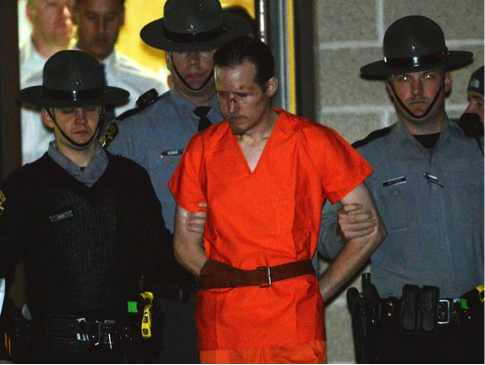Residents of Eastern Pennsylvania can sleep a bit easier now that Eric Matthew Frein was apprehended. Frein is accused of murdering Pennsylvania State Police Corporal Bryon K. Dickson and the attempted murder of another officer, Alex Douglass. Authorities scoured the Pocono Mountains looking for this self-professed survivalist for forty-eight days. On October 30, U. S. Marshalls found Frein near an abandoned airfield, handcuffed him, and placed him in a police cruiser. The man with a hatred for authority had been captured.

(Photo: AP/Jason Farmer, The Scranton Times & Tribune) USA Today
As it turns out, the handcuffs placed on the fugitive once belonged to Corporal Dickson, as did the cruiser used to transport Frein. According to Commissioner Frank Noonan, authorities “agreed that if we had the opportunity, then it would be fitting to use Corporal Dickson’s handcuffs…when we caught him.” At first glance, placing Dickson’s handcuffs on Frein is, indeed, a fitting response to the fear that has gripped the area. Symbolically, it represents the restoration of justice and safety seemingly safeguarded by the authority of law enforcement – with an added symbolic retribution forced upon the criminal. Perhaps, this handcuff story evokes a retributive sort of solidarity enacted as Dickson lives on in the form of his handcuffs now binding the hands of his alleged killer. But the story might also reveal our particular bondage to a certain vision of authority and justice as natural.
In his Discipline and Punish, Michel Foucault postulates an “ultimate crime” that would cut against the very authority of law enforcement (92). Such a crime would be one that exposes or unearths the imaginary rhetorical and affective strategies used to establish authority as natural. Frein, as is presumed, has a disdain for law enforcement, and thus his crime—the murder and attempted murder of law enforcement officials—cuts to the quick of his, and our, ability to attribute authority to “authorities.” Frein’s ultimate crime is thusly “ultimate” because even for those in support of law enforcement, his actions revealed the illusion of authority placed in the hands of the authorities.
But in our (possible) affinity for and celebration over this handcuff narrative, are we not also in rhetorical bondage to techniques of authorization at work here in this story? Foucault might suggest that this sort of handcuff discourse exhibits “a sort of general recipe for the exercise of power over men: the ‘mind’ as a surface of inscription for power…the submission of bodies through the control of ideas” (102). As Frein’s body submits to Dickson’s posthumous authority, we, too, submit our bodies to the “control of ideas.”
A crisis of authority unfolded over these last two months, where not only was the authority of law tarnished by the murder and attempted murder of two of its representatives, but by the seeming impossibility of officers to apprehend Frein. The “ultimate crime” of rejecting the authority of the law was, in a way, bolstered during the time authorities literally wandered in the wilderness unable to find Frein, unable to find their authority. Thus, the reestablishment of authority requires more than the apprehension of the suspect. It requires an ideological corrective for the masses, so that imaginary authority might come back into our view.
Following Joseph Michel Servan, Foucault reminds:
When you have thus formed the chain of ideas in the heads of your citizens, you will then be able to pride yourselves on guiding them and being their masters. A stupid despot may constrain his slaves with iron chains; but a true politician binds them even more strongly by the chain of their own ideas; it is at the stable point of reason that he secures the end of the chain…despair and time eat away the bonds of iron and steel, but they are powerless against the habitual union of ideas…and on the soft fibres of the brain is founded the unshakable base of the soundest of Empires (102-3).
As “despair and time ate away” public trust in the authorities’ ability to apprehend Frein, more than time, emotional energy, and money were lost. The effect of authority was lost. To this extent, by the time Frein was captured, he was not the only fugitive in new need of bondage. Officials needed to remind us of the sovereignty of the law, their authority that apparently extends beyond and transcends any one officer or even death. This reminder came in the form of a rhetorical effect, a strategy enacted as an ontological corrective where illusions come to be (re)constituted as the natural order of things. Justice and authority restored, as we are handcuffed to authority by our own affective sensibilities when we’re told that justice and authority cannot and will not be denied.
